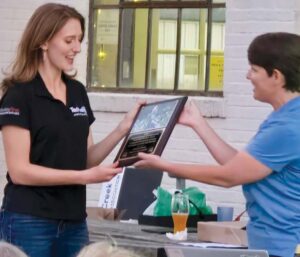
In recognition of the outstanding and lasting contributions to the Gills Creek Watershed, Catherine Massey (l) and Technetics Group Columbia are the recipients of the 2025 Watershed Wonder award. Photo courtesy of Gills Creek Watershed Association
In the world of advanced manufacturing, few companies balance technological innovation with environmental stewardship as seamlessly as Technetics Group. This global leader in engineered sealing and critical components serves industries such as aerospace, nuclear energy, life sciences, and semiconductors.
Technetics Group is a division of Enpro Industries, an industrial technology company known for its commitment to sustainability, safety, and excellence.
At the Columbia site of Technetics Group, one employee is turning corporate values into tangible impact. Catherine Massey is spearheading a conservation initiative that is transforming the company’s landscape and setting a precedent for industrial environmental leadership.
Growing up in Charleston, Catherine spent her childhood immersed in the arts and natural beauty of the Lowcountry. Whether perched in the live oak at her family home or diving into school projects and extracurriculars, she was always exploring. Encouraged by family and educators who emphasized the importance of intelligence and curiosity, she developed a deep love for learning.
Her love for nature was nurtured further in the Ozarks, where she spent time on her family’s land with her grandfather, a pious naturalist and seasoned outdoorsman.
“I’d ask him to name every tree,” Massey recalls with a smile. “He was patient, but eventually, they all became birch trees.”
When she discovered Technetics Group Columbia, she found a company whose products have incredible applications and whose culture genuinely reflects its values. The company’s core values of Safety, Excellence, and Respect aren’t just buzzwords. From the production floor to the executive suite, employees are encouraged to participate, grow, and contribute. The company embraces a dual bottom line, prioritizing both business growth and the development of internal talent. Part of that culture is a grouping of teams cleverly known as SEAL, Safety Education And Leadership. Catherine heads the communication and activities team and environmental team.
Through a combination of her life experiences and academic exploration in biological sciences at the University of South Carolina, Catherine developed a keen eye for ecological patterns. She noticed American Robins feeding on invasive Bradford Pear fruits and identified an underutilized area behind the building as an ideal spot for a native habitat patch. She envisioned a keyhole garden that would engage employees in composting while supporting local wildlife. Selecting plants native to the site was essential to maximize ecological benefits. Her research into the surrounding environment revealed that the site borders the Gills Creek Watershed, a Richland County landmark.
From there, a transformative initiative began to take shape into Conservation Gardens, her project that connects conservation, business strategy, and community impact. Catherine draws inspiration from a team of talented coworkers and leadership that combines encouragement with strong business insight. Their inspiration helped her see conservation could be more than a passion and also a smart business move.
“With the right mindset, I knew we could make something meaningful happen,” she said. “We have the skills, the drive, and the business sense. I just needed to find the money to bring it to life.”
The Conservation Gardens initiative includes removing invasive Bradford Pears and replacing them with native species that support pollinators and birds. It also involves constructing a beautiful employee break area out of pervious materials to filter runoff. Keyhole gardens will be attached to promote composting and native plant growth. Additionally, a large rain garden will be built outside the security fence to improve stormwater management and reduce runoff into Gills Creek. Informational signage near all the developments will help educate employees and the public, encouraging others to follow suit.
These efforts will make Technetics Group Columbia the first industrial Watershed Champion recognized by the Gills Creek Watershed Association (GCWA) and a participant in the Wildlife and Industry Together (WAIT) program through the South Carolina Wildlife Federation.
Her vision also includes financial benefits. By improving stormwater infrastructure and leveraging the site’s proximity to the protected watershed, the company could save up to 60 percent on monthly water utilities. “I love conservation, and I love money,” she said. “That’s what I call a return on investment.”
To fund the project, Massey secured a $20,000 grant from the Richland County Conservation Commission. Technetics Group and its parent company, Enpro Industries, are not only matching the required 20 percent contribution, but they are also exceeding it, showing strong support for the initiative.
Although the project is ongoing until June 15, 2026, it is already gaining international recognition. Enpro’s global leadership is celebrating the innovative approach, and Catherine, on behalf of Technetics Group Columbia, has been named GCWA’s 2025 Watershed Wonder.
Combine Catherine Massey’s determination to establish keystone species at the Technetics Group Columbia property with a supportive employer whose mission aligns with enriching the environment and supporting the surrounding community, and you get a truly impactful model for corporate environmental stewardship. This partnership earned them the Gills Creek Watershed Association’s Watershed Wonder award.
Catherine hopes this project will spark a movement among businesses to rethink their role in environmental stewardship.
“We’re proud of this work, and we want others to see that it’s possible,” she said. “South Carolina is my home. It’s beautiful, rich in biodiversity, and full of potential. As business continues to grow here, so should our commitment to protecting what makes this place special.”
She’s also quick to point out conservation isn’t just good for the planet. It’s good for the bottom line.
“This project proves conservation and business strategy can go hand in hand,” she said. “If you look closely, the opportunities are there. And if you get creative, you’ll find the funding, too. Native plants, cleaner water, happier employees, and lower utility bills? That’s not just sustainability, that’s smart business.”
For more information, visit technetics.com, www.gillscreekwatershed.org, www.scwf.org, and enpro.com.


Loading Comments